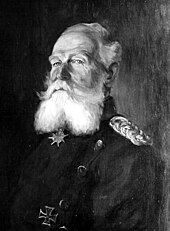Ernst von Unger
Ernst Karl Friedrich von Unger (born June 5, 1831 in Groß-Stöckheim near Wolfenbüttel , † October 10, 1921 in Falkenberg ) was a Prussian officer , most recently a general of the cavalry .
Life
origin
Ernst was the youngest and sixth child of the Braunschweig Privy Councilor and landowner Friedrich von Unger (1792–1867) and his wife Henriette, née von Schrader (1795–1837).
Military career
Not his education received at the school Great school in Wolfenbüttel and the cadet schools in Potsdam and Berlin. At the age of 18 he became a second lieutenant in the Guard Hussar Regiment in Potsdam, which marked the beginning of his military career. Promoted to Rittmeister in 1859 , he first came to the Great General Staff in Berlin, then to the General Staff of the 6th Division in Brandenburg. In this position he was involved in all major decisions in the German-Danish War of 1864. Due to the services he acquired, he was promoted to the youngest major in the Prussian Army at the end of the war . In Potsdam he became a member of the Masonic Lodge Teutonia for Wisdom .
In the war against Austria in 1866 , he was employed as a general staff officer in the High Command of the 1st Army under Prince Friedrich Karl Nikolaus of Prussia . For a very important daring exploratory ride on July 2, 1866, the day before the battle of Königgrätz , he received the highest Prussian war award, the order Pour le Mérite . A detailed report on this ride and its significance for the planning and outcome of the battle can be found in Theodor Fontane's book “The German War of 1866”.
In the Franco-Prussian War he was a colonel (since July 26, 1870) and chief of the general staff of the VII Army Corps . As such he participated in the battles at Spicheren , Colombey and Gravelotte as well as the siege of Metz . In November 1870, however, he fell so seriously ill that he was unable to work in the further course of the war. After his recovery, he was initially able to continue his military career. In 1874 he became brigade commander, in 1875 major general , in 1881 lieutenant general and commander of the 22nd division in Kassel. In this position, however, for health reasons, he had to finally ask for his departure, which was granted to him on December 3, 1887 while simultaneously conferring the character of general of the cavalry.
Unger spent his old age in Berlin. In recognition of his services, Wilhelm II awarded him the Golden Crown for Pour le Mérite on September 13, 1916. After the First World War , he moved to his daughter Hildegard von Alvensleben in Falkenberg near Fürstenwalde, where he died at the age of 90 and found his final resting place in the local family cemetery.
family
Unger was married to Agnes Müller von Lauingen (1835–1914) from Lauingen near Braunschweig and had three children with her:
- Hans (1856-1900)
- Kurt (1859–1931), Prussian general of the cavalry
- Hildegard (1864–1942) ∞ Joachim von Alvensleben (1856–1932) from Falkenberg near Fürstenwalde
literature
- Theodor Fontane : The German War of 1866. Berlin 1871, pp. 457–464.
- Kurt von Priesdorff : Soldier leadership . Volume 10, Hanseatische Verlagsanstalt Hamburg, undated [Hamburg], undated [1942], DNB 986919810 , pp. 447-451, no. 3320.
- Wolfgang von Groote, Ursula von Gersdorf: Decision 1866. The war between Austria and Prussia. Published by the Military History Research Office. Stuttgart 1966. p. 156, 278-290.
- Memoirs of General Ernst von Unger from the campaigns of 1864 and 1866. Unpublished manuscript.
Individual evidence
- ↑ Gothaisches genealogical pocket book of the letter aristocratic houses 1909. Third volume, p.547
| personal data | |
|---|---|
| SURNAME | Unger, Ernst von |
| ALTERNATIVE NAMES | Unger, Ernst Karl Friedrich von (full name) |
| BRIEF DESCRIPTION | Prussian officer, general of the cavalry |
| DATE OF BIRTH | June 5, 1831 |
| PLACE OF BIRTH | Groß-Stöckheim near Wolfenbüttel |
| DATE OF DEATH | October 10, 1921 |
| Place of death | Falkenberg |
